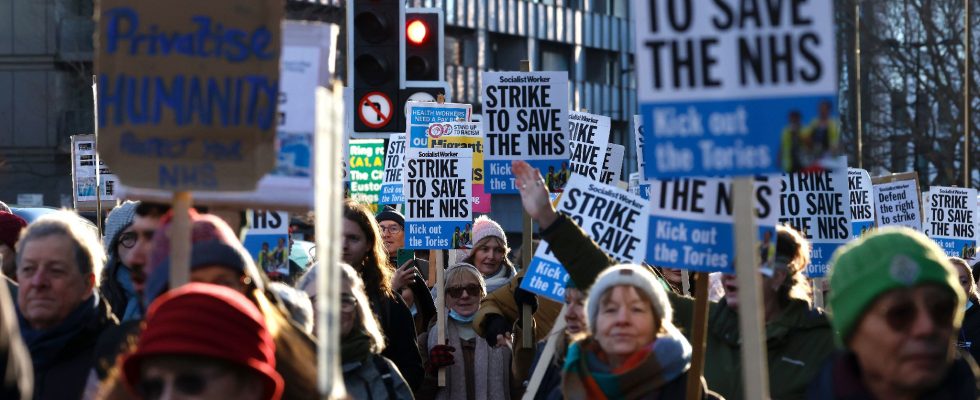Mobilization continues to grow in the UK. Thursday, July 20, tens of thousands of Britons took to the streets to denounce the rise in the cost of living caused by inflation for several months. A rise in consumer prices of 7.9% in June 2023, the strongest of the G7 countries.
Teachers, postal workers, train drivers… If the civil servants are strongly mobilized, one sector is more represented than the others in the processions: the nursing staff of the National Health Service (NHS), the free health service of the United Kingdom. The institution has just celebrated its 75th anniversary in early July, a rare symbol of unity for British citizens, but risks according to the unions not celebrating its 80th anniversary if nothing changes.
Up to 500 deaths per week due to waiting times
Since the beginning of the year, many professions in the state health service have indeed gone on strike in an unprecedented way: after the ambulance attendants in January, the nurses in February, the hospital doctors then the interns in April, it is the turn of experienced doctors and hospital dentists to join the movement, this Thursday, July 20.
All denounce a similar trend: the inability to properly care for their patients. The NHS is also very decried by the British themselves. In March 2023, the National Center for Social Research’s annual opinion poll even revealed that more than half of those questioned said they were dissatisfied with the quality of NHS care. Conversely, nearly 70% said they were satisfied in 2010. A situation that has worsened in less than twenty years, following several austerity policies and then the Covid-19 crisis.
The main reason given is the pick-up time. In April 2023, nearly 7.5 million English people were waiting for medical treatment. A British child sometimes has to wait up to 18 months for dental treatment with anesthesia, according to a BBC investigation published on Wednesday.
Worse, this wait can prove fatal: at the end of June, the tabloids widely relayed the death of a 44-year-old diabetic woman after waiting for an ambulance for 16 hours. According to the president of the Royal College of Emergency Medicine interviewed by The Times last January, these waiting times would cause the death of nearly “500 patients per week”.
More than 100,000 vacancies
Inevitably, social movements amplify the phenomenon: in eight months, more than 600,000 medical appointments have been postponed, according to the chief medical officer of the NHS Stephen Powis. But for the nursing staff on strike, the problem lies above all in the lack of medical personnel to take care of these patients.
In all, 112,000 posts in the British health service would be vacant, specifies AFP. According to the OECD, the United Kingdom will have 3.2 doctors per 1,000 inhabitants in 2022, placing it in last place among Western European countries.
This lack of staff leads to a drop in the quality of care and poor working conditions: again according to the study by the National Center for Social Research, three quarters of NHS employees were planning to leave the NHS at the end of 2022.
If these vacancies are for the moment compensated by recruiting more than half of the new doctors and nurses abroad, British Prime Minister Rishi Sunak announced at the end of June a major plan to recruit 300,000 caregivers for England. A project completed by a training plan of 2.4 billion pounds to train British doctors.
A continuous drop in wages for fifteen years
On the union side, the main demand remains the upgrading of these professions to make them more attractive. The nursing staff has indeed been facing a drop in wages for the past fifteen years, aggravated by inflation. For example, in-house doctors have seen their pay cut by 26% since 2008, according to the British Medical Association (BMA) union.
From then on, the striking health personnel demanded above all wage increases; the BMA union is asking for at least 35% more. A proposal deemed unreasonable by the British government on July 13, in a context where the British public sector debt exceeded 100% of GDP in May.
In the form of an ultimatum, the Ministry of Health has therefore put on the table an offer of an increase of 5 to 7% depending on the sector. Aid which would be partly financed by multiplying by two or three the surcharge paid by foreigners to obtain treatment in the United Kingdom. Negotiations between strikers and the government therefore still seem far from over. Last Monday, experienced doctors and the BMA union refused this offerannouncing at the same time two new strikes on 24 and 25 August.
